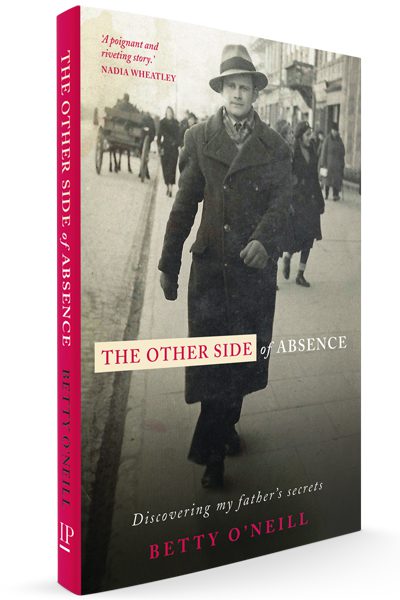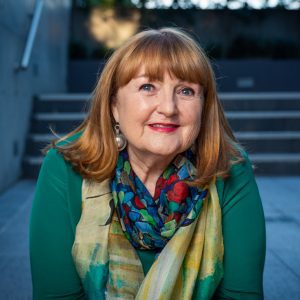Betty O'Neill

Details
Author name: Betty O’Neill
Book title: The Other Side of Absence: Discovering my father’s secrets
Genre: Memoir
Launch date: 05.08.2020
Website: www.bettyoneill.com
Social media
Buy links
Summary
Betty O’Neill grew up knowing very little about her father, Antoni. She knew that he had fled Poland after World War Two, that he had disappeared overnight when she was just an infant, and that his brief reappearance when she was a young adult had been a harrowing, painful ordeal.
Fifty-five years after he deserted her family, Betty is determined to find out more. What drove him to abandon them, twice? What was his story? Who was Antoni Jagielski?
Her search for the truth takes Betty to Poland, where she unexpectedly inherits a family apartment from the half-sister she never knew – a time capsule of her father’s life. Sifting through photos and letters she begins to piece together a picture of her father as a Polish resistance fighter, a survivor of Auschwitz and Gusen concentration camps, an exile in post-war England, and a migrant to Australia. But the deeper she searches, the darker the revelations about her father become, as Betty is faced with disturbing truths buried within her family.
Honest, compelling, and meticulously researched, The Other Side of Absence is an elegant debut memoir of resilience and strength, and of a daughter reconciling the damage that families inherit from war.
Theme
Briefly describe your book’s core message:
The Other Side of Absence explores the themes of family secrets, family history, the long tail of war (it is not only those who go to war who are affected but also the families to whom they return), and the resilience of survivors. It is a story of a daughter’s search to understand her absent father and the decisions he made.
Let's talk about it
Tell us something about yourself that not many people know.
As is revealed in my book, as a child I was fostered out to almost a dozen different families between the age of two and nine, when I was sent to boarding school. This was as a result of my mother being abandoned by my war-damaged father and being unable to keep me as a single mother in the 1950s and 60s. Not many people know this fact.
Why did you choose these themes in your book and were you aware of them from the outset?
The writing of this book and hence its themes, happened serendipitously and quite unexpectedly. I was attending a writing course and our homework on day one was to finish the sentence “The first time I met…”and keep writing for 20 minutes. I wrote, “The first time I met… my father I was nineteen.” I continued to write about that first meeting but then as we were asked to add to the story each day, I realised I knew very little about him. I knew he was in the Polish resistance during World War II, that he had been arrested and sent to Auschwitz, survived and ended up in England where he met and married my Australian mother. I was born, and we returned to Australia and my father disappeared. The themes emerged from my search to understand my father’s story and what had led him to make the decisions he made. I think the themes chose me.
How difficult was it for you to write this book? Did you face any obstacles?
There were many obstacles in the writing of this book. Much of my research was done in Poland, a country where I knew no-one, didn’t speak the language and in the midst of winter where it was dark by four o’clock in the afternoon. I had very little information to begin with – three documents and two photos, a few scratchy stories from my mother and I hadn’t seen or heard from my father since he returned to Poland, forty years before I began the search. I was a bit like a detective on a cold case investigation.
What are your writing habits or idiosyncrasies?
My preference is for total immersion, so when I can, I take chunks of time where I work, sleep and breathe writing, interspersed with walks in the bush or by water. I like to have a big desk with room for my notes, books, a candle and a pot plant. My current plant is a hot pink phalaenopsis or moth orchid which will flower for ages, looks stunning and makes me smile.
If you worked with a professional editor, what was the experience like?
Working with a professional editor was invaluable. Early readers of my manuscript were people who knew me and could fill in gaps from their knowledge of me whereas the editor was able to point out those omissions. Although mine is a story about my father, it is also about me, and she encouraged me to put in more of myself to enable a stronger emotional connection for the reader. She offered a really thoughtful reading of my work with constructive feedback that made a big difference to the finished product.
What’s next for your writing?
I have the first draft of another memoir written. It has been in the bottom drawer – well, on my computer, for almost ten years without me looking at it. I am both excited and a bit scared to open it up. It might be terrible and only deserving of the ‘delete all’ button, or maybe not. We shall see.
Author Bio

Betty O’Neill is a Sydney-based writer and teacher with a lively curiosity and a passion for learning. She has an eclectic range of degrees, most recently (2018) a Doctorate in Creative Arts and is a university Lecturer in Creative Intelligence and Innovation. She wrote her doctoral thesis on her quest to understand her father, a World War II Polish resistance fighter who survived four years of imprisonment in Auschwitz and Gusen. She has published and presented conference papers and facilitated workshops in Australia and overseas on writing family history, the Cold War, migration and the domestic space as an archive. The Other Side of Absence is her debut memoir.